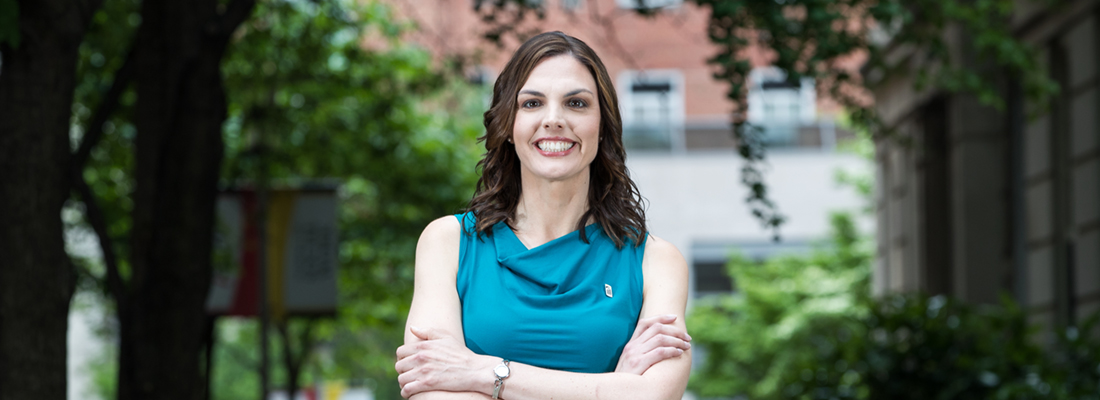Sally A. Hageman, MSW | University of Maryland School of Social Work
View Full 2017-2018 Champions of Excellence Gallery Find Out More About the Champions of Excellence Campaign
Social scientists usually focus on people, not numbers, making what Sally A. Hageman, MSW, is doing at the University of Maryland School of Social Work all the more amazing.
Hageman, a predoctoral fellow in the Center for Public Health Social Work Education and Training, likes working with data just as much as working with people to improve financial and health outcomes for vulnerable populations.
So much so that in 2017 she launched a new advanced research methods course, Public Health Financial Social Work. The aim of the course is to approach social problems with an emphasis on prevention, while also looking at the barriers and opportunities to increase the financial and health stability of clients. In her second year teaching the course, students collected data using the financial threat scale and self-reported health (SF-12) paper and pencil survey.
“This is new for these [social work] students. They aren’t used to working with and manipulating data,” she says. “The class gives them a sense of how to do research. And they learn to keep a research journal so they can do research to inform their practice.”
In the future, Hageman would like to include a practice component to the Public Health Financial Social Work course. In the first semester, students would gain the foundation skills of advanced research methods so they can conduct a quantitative data analysis project demonstrating the association between health and financial social work topics.
The second semester would give students the opportunity to apply what they’ve learned in the classroom to the real world through their field placement. Under the supervision of licensed social workers, social work students would collaborate with their field placement agencies to use research to benefit the agency’s clients and practices. With this structure, Hageman hopes to ignite students’ passion for research as a powerful tool to solve real-world problems.
At the University of Maryland, Baltimore (UMB), she saw a great opportunity to explore her research through collaboration with UMB’s strong medical, nursing, and dental schools and its Center for Interprofessional Education.
Not only has the Public Health Financial Social Work course been beneficial to the social work students of UMB, but also for the field of social work itself. When the Council on Social Work Education (CSWE) created its Economic Well-Being Curricular Guide in 2017, Hageman’s course syllabus was selected as an example of the type of class that exemplifies the CSWE’s Educational Policy and Accreditation Standards. Hageman is incredibly proud of this honor, specifically because of the impact the curricular guide has.
“It’s really helpful to educate others in the field,” she says. “By getting the word out, we are helping to encourage [social work educators] to collaborate with other disciplines to solve problems in creative ways, because at the end of the day we’re all moving toward the same goal.”
Consistent collaboration through a variety of disciplines, specializations, and backgrounds is, for Hageman, what creates the most innovative results.
Her main collaboration happens between the School of Social Work and the public health program based in the School of Medicine. She started working with students and faculty from both disciplines, under the framework of the social determinants of health. Utilizing both perspectives, Hageman hopes to find new solutions and interventions to social problems in a way that complements the critical thinking of both social workers and public health researchers.
Reaching this collaborative end means initially overcoming the obstacles of cross-disciplinary research. From the beginning of her studies, Hageman noticed a language gap between the two disciplines. “Language is powerful,” she says. “There’s certain language we use in social work about finance and health, and in public health they use different language. ... I’ve been trying to bring those [languages] together.”
Another difference between the two disciplines, Hageman notes, is that “in our social work [master’s] program we don’t teach statistics, [but] in public health that’s like a basic, they have to have that.” So Hageman decided to help bridge that gap, too. Her course’s combination of advanced research methods prepares social work students to apply rigorous research methods in their practice.
“That’s what I’m really excited about — sharing the resources, and eventually ending with better patient or client outcomes for both financial security as well as health,” she says.
This interdisciplinary collaboration, for Hageman, is what makes UMB unique.
“The community at UMB is very supportive, overwhelmingly supportive. I have had many opportunities to pursue what I want to do in my research … and [UMB faculty and staff] are going to do whatever they can to put you in a position to be successful,” she says.
In addition to pursuing her PhD, Hageman works at her local YMCA as an instructor in Nia, a holistic fitness practice that combines dance, martial arts, and mindfulness to address all aspects of life. “It’s all about being present, letting go, and removing anxiety. I bring those ideas into my class when my students are stressed out,” she says.
After finishing her doctorate in May 2019, she plans to find a full-time academic position where she can teach, conduct research, and continue to work with other departments and disciplines, and make connections with other researchers across the world.



